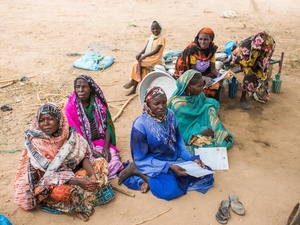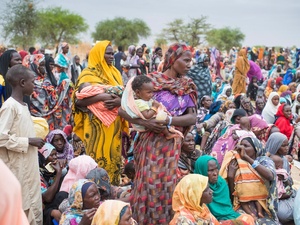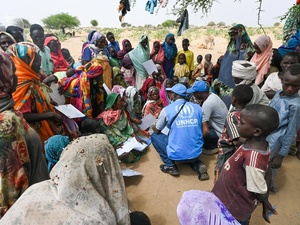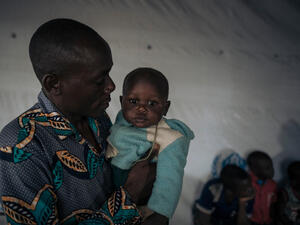Central African Republic: UNHCR leads join mission to remote north-east
Central African Republic: UNHCR leads join mission to remote north-east
Over the weekend, UNHCR led a joint UN/NGO mission to the Birao area, in the remote north-east of the Central African Republic (CAR). The area had been the scene of attacks by a militant group, the Union des Forces Démocratiques pour le Rassemblement (UFDR [Union of Democratic Forces for Unity]), in early March as well as last October. After the March attack on Birao town, almost the entire population of 14,000 fled. The fighting was intense and devastating for Birao's inhabitants. More than 700 houses were burned, destroying vital stocks of food and seeds for the upcoming planting season.
The joint mission found that while some of the town's residents are slowly starting to return and have begun to reconstruct their homes, others are too afraid to come back. Some residents have fled to Am Dafok at the border with Sudan and some 2,000 to 3,000 inhabitants of the region have already sought refuge in Sudan's Darfur region, where they are being helped with basic supplies by a joint UNHCR/NGO team.
An estimated 212,000 people have been driven from their villages in the CAR. Another 70,000 have fled to Cameroon, Chad and now also to Sudan. Most of them have fled since September 2005, when the north-western town of Markounda was attacked by another militant group. House burning is common from Ouham-Pendé prefecture in the north-west of the country to Vakaga prefecture in the north-east.
UNHCR is conducting a campaign to raise awareness among the authorities of conflict-affected areas and to sensitise members of the security and armed forces on the basic human rights of internally displaced people (IDPs). Five workshops have already been organised in the capital, Bangui, and the north-western towns of Bossangoa and Bozoum together with other humanitarian agencies. UNHCR, along with NGOs working in CAR, is distributing clothing, mosquito nets and some basic household items to the displaced. However, there are major logistical challenges in assisting them as most are scattered in villages or in the bush.
In order to assist survivors of violence, including victims of sexual violence, UNHCR is putting in place a system to provide psycho-social and medical follow-up, in Nana Grébizi prefecture in central-northern CAR. Through a network of humanitarian observers in the north-west, we are also closely monitoring the human rights situation and displacement movements. Other humanitarian organisations in CAR such as UNICEF, WHO, WFP, FAO, the International Rescue Committee, Solidarités, CARITAS, MSF, COOPI are involved in providing health care, drinking water, education and food, to address the urgent needs of the displaced population.









